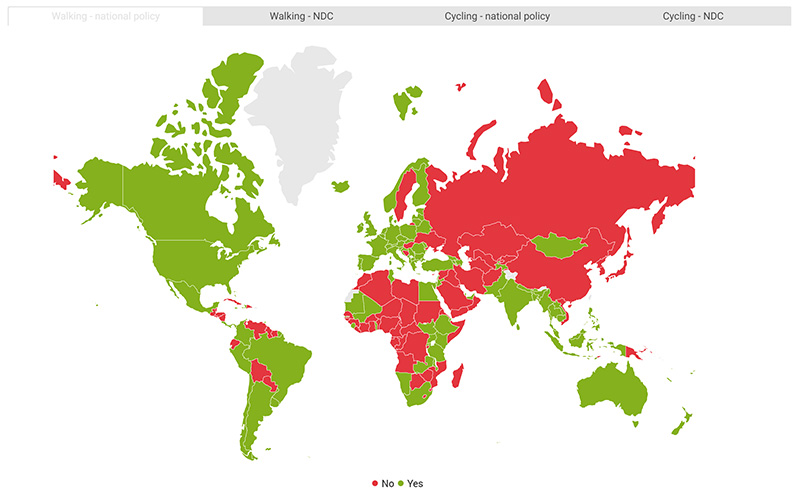Commit to active mobility through climate plans, says PATH with new guide and tracker, supported by the FIA Foundation

The Partnership for Active Travel and Health (PATH) coalition is calling for countries to commit to walking and cycling in the next round of Nationally Determined Contributions (NDCs) using new tools, with the support of the FIA Foundation.
PATH has launched two knowledge tools, an NDC guide and tracker, to support national policymakers to compare and benchmark existing policies, build capacity, and adopt active mobility as part of country climate commitments. NDCs are the formal carbon reduction commitments that governments make within the UNFCCC climate change framework process. PATH is calling for countries to build walking and cycling into their NDCs using its new Active Travel NDC Template. The template offers a step-by-step guide for national governments to strengthen commitments to walking and cycling within their NDCs. The guide is timely as the next NDC submission runs from November 2024 to February 2025, ahead of COP30 in Brazil.
The new tracker is a dashboard which visualises data from PATH’s report, National Policies for Walking and Cycling in all 197 UNFCCC countries. It offers an overview of the progress made by countries in integrating walking and cycling strategies into their policy frameworks, outlining objectives and planned interventions. Furthermore, it facilitates direct comparisons between countries and pinpoints areas requiring additional investment and ambition.

Active travel is significantly undervalued in NDCs, PATH research shows. Only eight countries had consistently linked their national policies with UN climate goals. Further, despite two-thirds of nations having active travel policies in place, there remains an urgent need for increased ambition, action, and investment to fully unlock the benefits of active mobility for climate targets.
This call to action comes in advance of the International Transport Forum (ITF) Summit in Leipzig, Germany, themed ‘Keeping Focus in Times of Crisis.’
Sheila Watson, Deputy Director of the FIA Foundation, stated: “These PATH tools represent a mandate to all countries – with this guide and benchmark there are no excuses not to include active mobility. It is vital for governments and decision-makers to understand the best ways to build active mobility into new climate commitments and understand where improvements are needed. Without bringing all countries into active mobility commitments, policy, and action, we simply cannot meet the goals of the Paris Agreement.”
Jim Walker, Founder of Walk21, said: “We want to support governments in becoming more ambitious and impactful with their NDCs. The template guides policymakers in maximising the potential of active travel for reducing transport emissions in a quick, affordable, and reliable way.”
Enabling more people to walk and cycle safely and to access public transport can cut transport emissions in half by 2030, contributing significantly to achieving the Paris Agreement. The NDC policy template outlines 20 action steps to create effective policies for active transport towards this outcome, including interventions to create safe and accessible places to walk and cycle, public campaigns to shift people’s mobility habits and embedding cycling and walking into policy processes.



